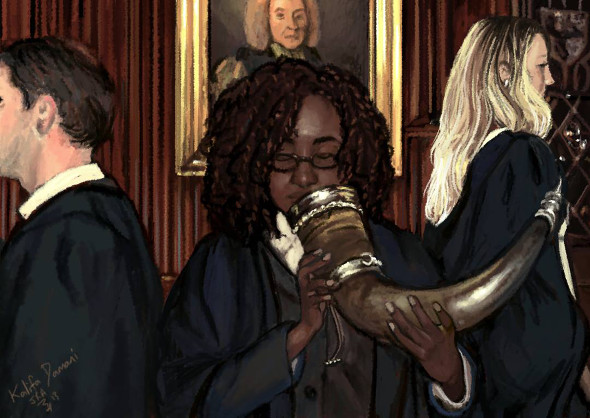
Members of the Department know Kalifa Damani, currently studying for the MPhil in Social and Developmental Psychology, as a dedicated and gifted student. However, they may be unaware that Kalifa is also a talented artist. Here, we interview Kalifa and introduce some of her remarkable artwork.
Q. What factors influenced your decision to apply for the MPhil in Social and Developmental Psychology course at Cambridge?
A. "By the end of my second year as an undergraduate student, three things became clear to me concerning what I was going to do next with my life. The first was that I loved psychology and research and wanted to study further. The second was that the courses that I took in social psychology and developmental psychology were the ones I thought were best able to allow me to achieve my goals of understanding, sharing, and improving the lives of young people from a wide range of socio-cultural/economic backgrounds (but particularly the disadvantaged); so I wanted to study both (SDP). Experiencing life in a different country, and gaining a deeper appreciation and understanding of people with a social/cultural experience that I perceived to be removed from, but still similar to my own, was the third conclusion. After a search through various postgraduate degrees online, I found that the MPhil offered by Cambridge was the only course/experience that offered exactly what I was looking for…and more. The thought of applying to Cambridge was very intimidating for me, but knowing that it was the only place that fit my three criteria, as well as having a rich history, strong research culture, and some of the most curious and gifted potential mentors/researchers in the world, it became the only option; and therefore was the only University that I applied to."
 Q. What is your typical day like?
Q. What is your typical day like?
A. "Days are pretty typical in the sense that I go to the Psychometrics Centre in the morning and work toward my MPhil, have lunch with some of my colleagues/friends from the centre at lunch time, and leave in the evening or afternoon. Depending on when I have classes, a seminar, or other lecture, I attend and then head back to the centre, or maybe home if it’s late. One day whilst walking to lunch with members of the Psychometrics Centre, John (Prof Rust) and I were talking about the trees in autumn. This was my first experience with the season, and with certain trees. He told me how the leaves feed the earth and the earth feeds the trees, and when I spoke about my ignorance of the nut on the ground, he bent down, picked it up, handed it to me and we spoke about chestnuts. At lunch that day, the group of us spoke about fire stations, things inside them, probably with random sprinklings of words like ‘statistically significant’, ‘probability of’ and other random references to psychology and statistics. On subsequent days I had conversations about everything from Structural Equation Modelling and current research to transforming into Vampire Santa Claus after eating cashew nuts. Work days tend to follow quite a typical format, but conversations do not. I’ve had some of the most interesting conversations with the people I work with…ranging from extremely sensible to absurdly nonsensical. It’s informative, amusing, refreshing and exciting."
Q. On which topics would you like to focus your research?
A. "I want to live in a world where groups of people don’t feel so far removed and distant from each other that they cannot empathise and support one another. I also  want to help people to recognise the beauty within their selves. Empathy and self-esteem are therefore variables that interest me a lot. Understanding the way people from different social groups think about themselves and others, as well as how thoughts and actions might affect relationships amongst people and perceptions of the self, especially within the youth (roughly 30 and under), is important to achieving my goals. So, I envision social psychology, and to a lesser extent developmental (and maybe cognitive) psychology as the academic tools I am best able to use in understanding and appreciating the experiences, thoughts, needs and concerns of different people. I also see the arts as a great way of sharing and applying psychological understanding within the world: facilitating empathy and social understanding in a manner that extends greatly beyond the ‘confines’ of published research in academic journals. I don’t think there’s a name for what I want to do, but I want to do academic research, and then share/utilize the findings/realizations of that research in a way that’s easily digestible and applicable to people’s everyday lives: hopefully through children’s story books, other books, film, art, music and public speaking."
want to help people to recognise the beauty within their selves. Empathy and self-esteem are therefore variables that interest me a lot. Understanding the way people from different social groups think about themselves and others, as well as how thoughts and actions might affect relationships amongst people and perceptions of the self, especially within the youth (roughly 30 and under), is important to achieving my goals. So, I envision social psychology, and to a lesser extent developmental (and maybe cognitive) psychology as the academic tools I am best able to use in understanding and appreciating the experiences, thoughts, needs and concerns of different people. I also see the arts as a great way of sharing and applying psychological understanding within the world: facilitating empathy and social understanding in a manner that extends greatly beyond the ‘confines’ of published research in academic journals. I don’t think there’s a name for what I want to do, but I want to do academic research, and then share/utilize the findings/realizations of that research in a way that’s easily digestible and applicable to people’s everyday lives: hopefully through children’s story books, other books, film, art, music and public speaking."
Q. How do you relax?
A. "I get great enjoyment, fulfilment and relaxation from artistic expression, particularly through painting, drawing and writing. Playing the piano was also part of that grouping, but I stopped a couple years ago; however, I hope to re-immerse myself in it someday. I enjoy using the arts to tell stories about people’s lived experience– and so my writing often facilitates either the sharing of my experiences, or that of others. I also love watching films, and hope to someday help create one. I see film as a great unifier of my interest in writing, visual imagery and music. My interests in Psychology and volunteerism stem significantly from my desire to understand, relate and improve the experience of life amongst and within others. I also enjoy hiking, picnics and activities that involve getting closer to nature!"

